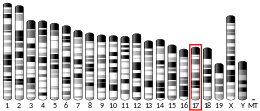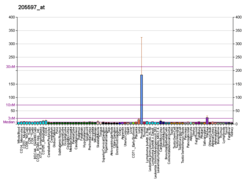Choline transporter-like protein 4
Choline transporter-like protein 4 is a protein that in humans is encoded by the SLC44A4 gene.[5][6][7]
See also
References
- ENSG00000204385, ENSG00000231479, ENSG00000228263, ENSG00000206378, ENSG00000235336, ENSG00000229077, ENSG00000203463 GRCh38: Ensembl release 89: ENSG00000232180, ENSG00000204385, ENSG00000231479, ENSG00000228263, ENSG00000206378, ENSG00000235336, ENSG00000229077, ENSG00000203463 - Ensembl, May 2017
- GRCm38: Ensembl release 89: ENSMUSG00000007034 - Ensembl, May 2017
- "Human PubMed Reference:". National Center for Biotechnology Information, U.S. National Library of Medicine.
- "Mouse PubMed Reference:". National Center for Biotechnology Information, U.S. National Library of Medicine.
- O'Regan S, Traiffort E, Ruat M, Cha N, Compaore D, Meunier FM (Mar 2000). "An electric lobe suppressor for a yeast choline transport mutation belongs to a new family of transporter-like proteins". Proc Natl Acad Sci U S A. 97 (4): 1835–40. doi:10.1073/pnas.030339697. PMC 26522. PMID 10677542.
- Traiffort E, Ruat M, O'Regan S, Meunier FM (Feb 2005). "Molecular characterization of the family of choline transporter-like proteins and their splice variants". J Neurochem. 92 (5): 1116–25. doi:10.1111/j.1471-4159.2004.02962.x. PMID 15715662.
- "Entrez Gene: SLC44A4 solute carrier family 44, member 4".
Further reading
- Maruyama K, Sugano S (1994). "Oligo-capping: a simple method to replace the cap structure of eukaryotic mRNAs with oligoribonucleotides". Gene. 138 (1–2): 171–4. doi:10.1016/0378-1119(94)90802-8. PMID 8125298.
- Suzuki Y, Yoshitomo-Nakagawa K, Maruyama K, et al. (1997). "Construction and characterization of a full length-enriched and a 5'-end-enriched cDNA library". Gene. 200 (1–2): 149–56. doi:10.1016/S0378-1119(97)00411-3. PMID 9373149.
- Uhl J, Penzel R, Sergi C, et al. (2002). "Identification of a CTL4/Neu1 fusion transcript in a sialidosis patient". FEBS Lett. 521 (1–3): 19–23. doi:10.1016/S0014-5793(02)02748-5. PMID 12067718.
- Strausberg RL, Feingold EA, Grouse LH, et al. (2003). "Generation and initial analysis of more than 15,000 full-length human and mouse cDNA sequences". Proc. Natl. Acad. Sci. U.S.A. 99 (26): 16899–903. doi:10.1073/pnas.242603899. PMC 139241. PMID 12477932.
- Clark HF, Gurney AL, Abaya E, et al. (2003). "The secreted protein discovery initiative (SPDI), a large-scale effort to identify novel human secreted and transmembrane proteins: a bioinformatics assessment". Genome Res. 13 (10): 2265–70. doi:10.1101/gr.1293003. PMC 403697. PMID 12975309.
- Mungall AJ, Palmer SA, Sims SK, et al. (2003). "The DNA sequence and analysis of human chromosome 6". Nature. 425 (6960): 805–11. doi:10.1038/nature02055. PMID 14574404.
- Xie T, Rowen L, Aguado B, et al. (2004). "Analysis of the gene-dense major histocompatibility complex class III region and its comparison to mouse". Genome Res. 13 (12): 2621–36. doi:10.1101/gr.1736803. PMC 403804. PMID 14656967.
- Ota T, Suzuki Y, Nishikawa T, et al. (2004). "Complete sequencing and characterization of 21,243 full-length human cDNAs". Nat. Genet. 36 (1): 40–5. doi:10.1038/ng1285. PMID 14702039.
- Gerhard DS, Wagner L, Feingold EA, et al. (2004). "The status, quality, and expansion of the NIH full-length cDNA project: the Mammalian Gene Collection (MGC)". Genome Res. 14 (10B): 2121–7. doi:10.1101/gr.2596504. PMC 528928. PMID 15489334.
- Kimura K, Wakamatsu A, Suzuki Y, et al. (2006). "Diversification of transcriptional modulation: large-scale identification and characterization of putative alternative promoters of human genes". Genome Res. 16 (1): 55–65. doi:10.1101/gr.4039406. PMC 1356129. PMID 16344560.
This article is issued from Wikipedia. The text is licensed under Creative Commons - Attribution - Sharealike. Additional terms may apply for the media files.




